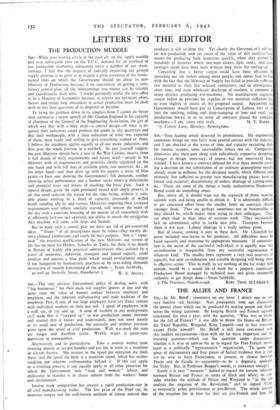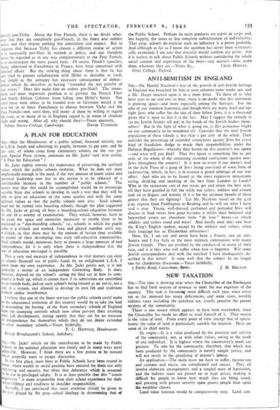THE ALLIES AND FRANCE
Sm,—In Mr. Belon comments on my letter 1 detect one or inc very familiar red herrings. Nazi propaganda long ago discovered the mental chaos which can be produced by making people ask them- selves the wrong questions. By keeping British and French opinion concerned, for over a year, with the question, " Who was to blame for the fall of France? " it was able to throw the blame on Britain, the Third Republic, Weygand, King Leopold—and in fact everyone except Hitler himself! Mr. Beloff is still more concerned lull: this endless recrimination—than with the far more important and in- teresting question—which was the question under discussion— whether it is wise or unwise for us to regard the Free French move- ment as a politically " representative " organisation. To quote one piece of documentary and four pieces of factual evidence that it ma) not be wise to force Frenchmen, at present, to choose between Petain and de Gaulle is—apparently—to be a dogmatic apologist for Vichy. But, in Professor Brogan's words, is innocence enough?
Surely it is very " innocent " indeed to regard the present relation, between Britain and France in terms of black and white; to con- sider whether the attitude of Petain and Weygand is " in the last analysis the 'negation of the Revolution," and to regard Vichy as necessarily either pro-German or pro-British. The whole interest of the situation lies in how far they are pro-French and how far merely pro-Vichy. About the Free French, there is no doubt what- ever that they are completely pro-French, in the finest and noblest sense, and they inspire nothing but admiration and respect. But to suppose that because Vichy has chosen a different course of action it is necessarily pro-Nazi in outlook or policy, and can therefore never be regarded as in any way complementary to the Free French, is to misinterpret the most patent facts. Of course Petain's speeches, being addressed to Frenchmen in France, have been concerned with internal affairs. But the striking thing about them is that he has not tried to present collaboration with Hitler as desirable in itself, but simply as the unhappy but necessary consequence of defeat: defeat which he describes as having " exceeded the just penalty of our errors." Does this make him-an ardent pro-Nazi? The imme- diate and most important problem is to prevent the French Fleet and North African Colonies from falling into Hitler's hands. Not until these were about to be handed over to Germany would it be wise for us to force Frenchmen to choose between Vichy and the Free French—nor, until then, will many uf them be willing to regard the issue, as so many of us in England regard it, in terms of absolute right and wrong. After all, why should they?—Yours sincerely,



























 Previous page
Previous page